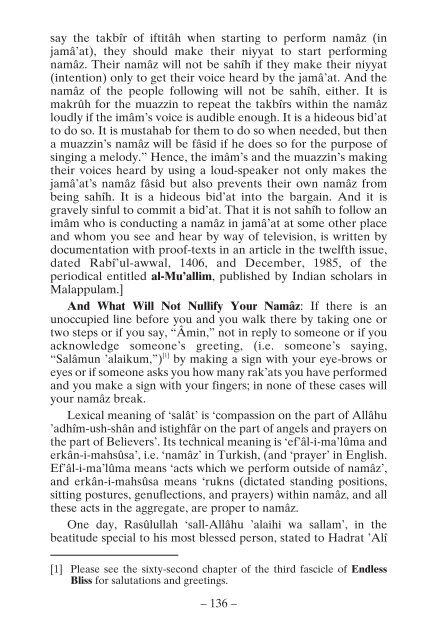Miftah-ul-Janna (Booklet for way to Paradise)
Create successful ePaper yourself
Turn your PDF publications into a flip-book with our unique Google optimized e-Paper software.
say the takbîr of iftitâh when starting <strong>to</strong> per<strong>for</strong>m namâz (in<br />
jamâ’at), they sho<strong>ul</strong>d make their niyyat <strong>to</strong> start per<strong>for</strong>ming<br />
namâz. Their namâz will not be sahîh if they make their niyyat<br />
(intention) only <strong>to</strong> get their voice heard by the jamâ’at. And the<br />
namâz of the people following will not be sahîh, either. It is<br />
makrûh <strong>for</strong> the muazzin <strong>to</strong> repeat the takbîrs within the namâz<br />
loudly if the imâm’s voice is audible enough. It is a hideous bid’at<br />
<strong>to</strong> do so. It is mustahab <strong>for</strong> them <strong>to</strong> do so when needed, but then<br />
a muazzin’s namâz will be fâsid if he does so <strong>for</strong> the purpose of<br />
singing a melody.” Hence, the imâm’s and the muazzin’s making<br />
their voices heard by using a loud-speaker not only makes the<br />
jamâ’at’s namâz fâsid but also prevents their own namâz from<br />
being sahîh. It is a hideous bid’at in<strong>to</strong> the bargain. And it is<br />
gravely sinf<strong>ul</strong> <strong>to</strong> commit a bid’at. That it is not sahîh <strong>to</strong> follow an<br />
imâm who is conducting a namâz in jamâ’at at some other place<br />
and whom you see and hear by <strong>way</strong> of television, is written by<br />
documentation with proof-texts in an article in the twelfth issue,<br />
dated Rabî’<strong>ul</strong>-awwal, 1406, and December, 1985, of the<br />
periodical entitled al-Mu’allim, published by Indian scholars in<br />
Malapp<strong>ul</strong>am.]<br />
And What Will Not N<strong>ul</strong>lify Your Namâz: If there is an<br />
unoccupied line be<strong>for</strong>e you and you walk there by taking one or<br />
two steps or if you say, “Âmin,” not in reply <strong>to</strong> someone or if you<br />
acknowledge someone’s greeting, (i.e. someone’s saying,<br />
“Salâmun ’alaikum,”) [1] by making a sign with your eye-brows or<br />
eyes or if someone asks you how many rak’ats you have per<strong>for</strong>med<br />
and you make a sign with your fingers; in none of these cases will<br />
your namâz break.<br />
Lexical meaning of ‘salât’ is ‘compassion on the part of Allâhu<br />
’adhîm-ush-shân and istighfâr on the part of angels and prayers on<br />
the part of Believers’. Its technical meaning is ‘ef’âl-i-ma’lûma and<br />
erkân-i-mahsûsa’, i.e. ‘namâz’ in Turkish, (and ‘prayer’ in English.<br />
Ef’âl-i-ma’lûma means ‘acts which we per<strong>for</strong>m outside of namâz’,<br />
and erkân-i-mahsûsa means ‘rukns (dictated standing positions,<br />
sitting postures, genuflections, and prayers) within namâz, and all<br />
these acts in the aggregate, are proper <strong>to</strong> namâz.<br />
One day, Rasûl<strong>ul</strong>lah ‘sall-Allâhu ’alaihi wa sallam’, in the<br />
beatitude special <strong>to</strong> his most blessed person, stated <strong>to</strong> Hadrat ’Alî<br />
[1] Please see the sixty-second chapter of the third fascicle of Endless<br />
Bliss <strong>for</strong> salutations and greetings.<br />
– 136 –

















